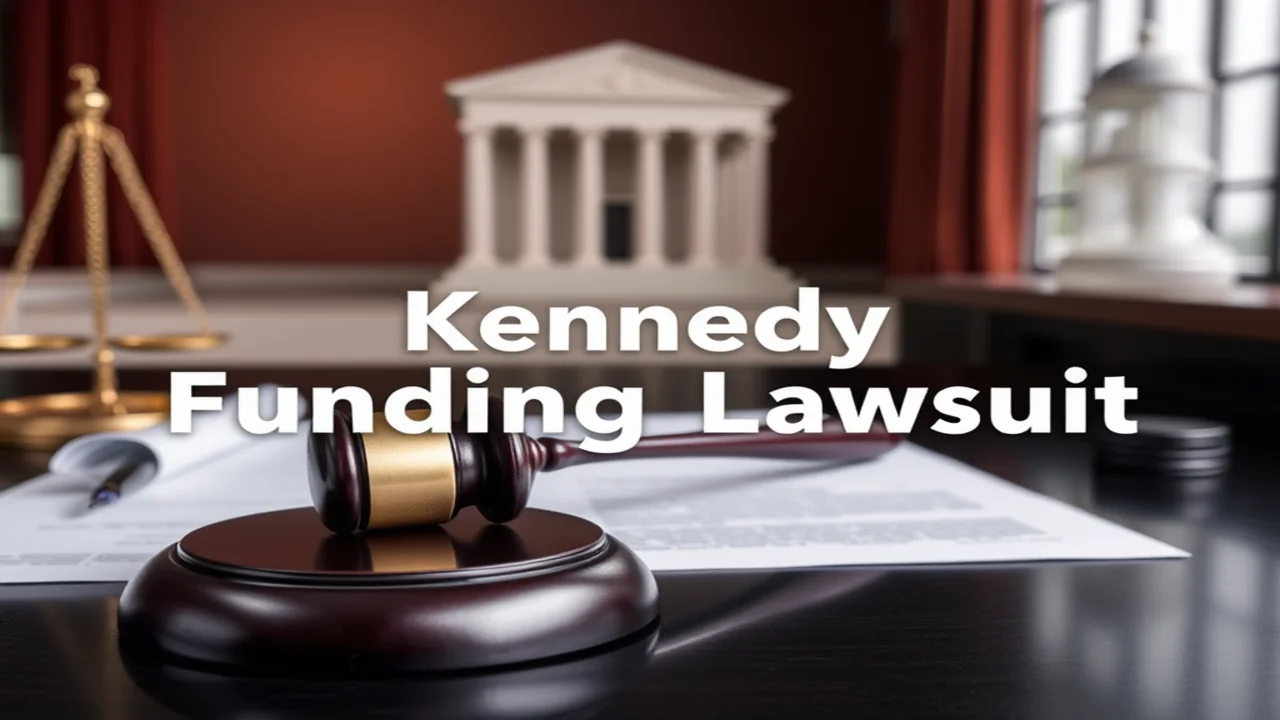Kennedy Funding Lawsuit: Inc. v. Greenwich Landing,Inc. v. Lion’s Gate Development,LLC
Introduction
Commercial lenders are taking notice of the Kennedy Funding lawsuit because it questions the motives and methods of private lenders who focus on high-risk real estate loans. The case calls into question the lending industry’s openness, accountability, and ethical behavior as it centers on claims of fraud and breach of contract. This article explores the Kennedy Funding lawsuit thoroughly, covering its main points and the wider consequences for the commercial lending industry.
What is the Kennedy Funding Lawsuit?

A prominent private lender known for its high-risk commercial real estate loans, Kennedy Funding, Inc. is at the center of the Kennedy Funding lawsuit. In a notable case involving Virgil Shelton and Willie Acklin, the company was accused of fraudulent practices and breach of contract. The role of this lawsuit in investigating lenders’ moral and legal obligations has grown increasingly significant.
Major Highlights of the Kennedy Funding Lawsuit
Breach of Contract Allegations
Virgil Shelton’s allegations of breach of contract are at the heart of the case. These claims illuminate the nitty-gritty of commercial lending’s contractual issues.
The Rest in Peace Cemetery Transaction
After Virgil Shelton’s financial troubles arose, the 1992 sale of Rest in Peace Cemetery to Willie Acklin became more convoluted. The legal controversy began when Acklin sought a loan from Kennedy Funding.
Loan Agreement Details
Kennedy Funding consented to lend money, with $675,000 going to Shelton specifically. Nevertheless, Shelton was prompted to initiate legal action due to the withholding of this sum during the closing procedure.
Court Proceedings and Initial Verdict
According to Shelton, Kennedy Funding was in breach of contract. Shelton was granted $1.675 million in damages by a jury, which was subsequently reduced to $675,000 during his appeal.
Key Lessons on Contractual Clarity
To prevent disagreements and possible litigation, this case highlights the importance of having clear, unambiguous contracts between borrowers and lenders.
Fraud Allegations and Their Impact
Dismissal of Fraud Claims
In the end, there was not enough evidence to dismiss the fraud charges. Nonetheless, the claims brought to light here underscore the significance of lending with integrity.
Reputational Damage to Kennedy Funding
The allegations of fraud were ultimately dropped, but they damaged Kennedy Funding’s reputation and showed how such accusations can damage a company’s credibility.
Importance of Transparency in Lending
The importance of private lenders being open and honest with their clients and acting ethically is highlighted by this part of the case.
The Role of Regulatory Scrutiny
Increased Oversight of Private Lenders
In light of the Kennedy Funding case, regulatory agencies are checking private lenders more thoroughly for ethical and legal compliance.
Call for Stricter Compliance
This case shows how the commercial lending sector needs stronger compliance regulations to safeguard borrowers’ rights.
Broader Industry Implications
For the lending sector, this lawsuit should be a wake-up call to implement policies that value honesty, openness, and responsibility.
Broader Implications of the Kennedy Funding Lawsuit
Impact on Commercial Lending Practices
The case has changed the game for private lenders by highlighting the significance of honesty and transparent agreements.
Consumer Protection Measures
In situations involving high-risk lending, strong consumer protection measures are necessary, as shown by legal challenges such as these.
Shaping Industry Standards
Addressing predatory lending practices and holding financial institutions accountable has been made possible by this case.
Key Figures and Events in the Kennedy Funding Lawsuit
Virgil Shelton and His Claims
Kennedy Funding was the target of serious accusations made by Virgil Shelton, a prominent plaintiff. He asserted claims of breach of contract due to the non-payment of $675,000. This amount was stipulated in the loan agreement. The case gained significant attention due to Shelton’s dogged pursuit of legal action, which highlighted the significance of upholding contractual agreements.
Willie Acklin’s Role in the Case
Here, the borrower, Willie Acklin, was in a bind financially and turned to Kennedy Funding for a loan. The promise to pay Shelton was a condition of the loan, but that promise was never kept. Borrowers in high-risk lending situations are as susceptible as Acklin was due to his financial difficulties and dependence on such loans.
The Court’s Examination of Evidence
The court reviewed all of the loan paperwork, contracts, and correspondence during the trial. At first, the jury decided to award damages to Shelton based on the evidence that was given. At this point in the trial, the importance of thorough documentation in preventing disagreements in the future became very clear.
Themes in the Kennedy Funding Lawsuit
Breach of Contract in Lending Agreements
Lenders must uphold their end of the bargain as this lawsuit asserts a breach of contract. Significant legal and financial ramifications can result from parties failing to fulfill their contractual obligations, as shown in this case.
The Dismissal of Fraud Allegations
The allegations of fraud were dropped because there wasn’t enough proof, but their inclusion highlights how damaging these claims can be to a person’s reputation even in the absence of a conviction. Ethical lending practices are emphasized in this element of the case.
Precedents Set by the Case
A new standard for the treatment of breach of contract actions involving high-risk lenders has been established by the Kennedy Funding case. The case is a benchmark for future decisions in cases where private lenders and their clients are involved in a dispute because legal professionals frequently use it to evaluate such cases.
Broader Industry Lessons from the Kennedy Funding Lawsuit
Transparency in Loan Agreements
It is crucial for loan agreements to have explicit and understandable terms, as this lawsuit shows. To ensure mutual trust and legal clarity, it is crucial that both the borrower and the lender fully comprehend the terms in order to prevent disputes.
The Need for Ethical Lending Practices
Lenders have an ethical obligation to protect their borrowers from predatory practices, as alleged in the Kennedy Funding lawsuit. It is especially important for high-risk lenders to consider how their actions might affect borrowers who are particularly vulnerable.
Impact on Regulatory Frameworks
As a result of this case, people are talking about how the commercial lending sector needs more regulation. There have been demands for stricter legislation to safeguard borrowers from predatory lending and avoid future disputes of this kind.
Appeal Process and Its Implications
Reduction of Damages Awarded
The amount of damages awarded to Virgil Shelton was reduced from $1.675 million to $675,000. This reduction occurred after the appeal. The appellate court’s thorough review of the trial’s evidence and arguments led to this substantial reduction.
Legal Strategies Used by Kennedy Funding
A reevaluation of the evidence and damages was the primary focus of the legal team representing Kennedy Funding as they challenged the initial verdict. Their approach exemplifies the intricacy of appealing prominent business loan cases.
Impact of the Appeal on the Lending Industry
Borrowers’ and lenders’ legal rights have been a topic of discussion since the appeal’s outcome. The importance of appellate courts in maintaining the integrity and precision of the judicial process is underscored by this.
Ethical Considerations in High-Risk Lending
The Role of Due Diligence
The significance of comprehensive due diligence for lenders and borrowers is highlighted by this case. Misunderstandings and possible legal disputes can be avoided with thorough investigation and documentation.
Addressing Power Imbalances
When it comes to high-risk loans, the power dynamic is typically tilted in favor of the lenders. Equal protection under the law must be guaranteed in such agreements, as the Kennedy Funding case has shown.
Promoting Best Practices in the Industry
A number of industry players have responded to the lawsuit by committing to more ethical and transparent practices that put the needs of their clients first. Restoring faith in the industry and averting similar crises in the future are the goals of these adjustments.
Regulatory and Compliance Lessons from the Case
Increased Focus on Consumer Rights
The case has shown how critical it is to safeguard customer rights when dealing with high-risk loans. To make sure lending practices are following the rules, regulatory agencies are now keeping a closer eye on them.
Role of Legal Frameworks in Preventing Disputes
To avoid conflicts such as the one in the Kennedy Funding case, strong legal frameworks are essential. To keep the lending environment fair and ethical, these frameworks must be strengthened.
Encouraging Voluntary Industry Reforms
Lenders have shown their dedication to ethical practices by voluntarily adopting reforms that increase transparency and accountability, in addition to regulatory actions.
FAQs
1. What was the Kennedy Funding lawsuit about?
The lawsuit centered on allegations of breach of contract and fraud involving a loan transaction where funds meant for Virgil Shelton were withheld at closing.
2. Who were the key figures in the lawsuit?
Virgil Shelton, Willie Acklin, and Kennedy Funding, Inc. were the central figures, with Shelton accusing Kennedy Funding of contractual breaches.
3. What was the outcome of the case?
A jury awarded Shelton $1.675 million, later reduced to $675,000 on appeal. The fraud claims were dismissed due to insufficient evidence.
4. How has the case impacted the lending industry?
The case has led to increased regulatory scrutiny, calls for stricter compliance, and a renewed focus on ethical lending practices.
5. Why is this case significant?
It highlights the importance of transparency, ethical conduct, and clear contractual agreements in the commercial lending sector.
Read More: Streamlining Workflows: How Workforce Management Software Transforms Business Operations
Conclusion
The Kennedy Funding lawsuit highlights the need for commercial lenders to be accountable, transparent, and ethical in their dealings with borrowers. To stay out of hot water and protect their reputations, lenders must put customer trust and compliance first in an increasingly scrutinized industry. The case highlights the importance of reforms and the far-reaching effects of unethical behavior in financial transactions.







